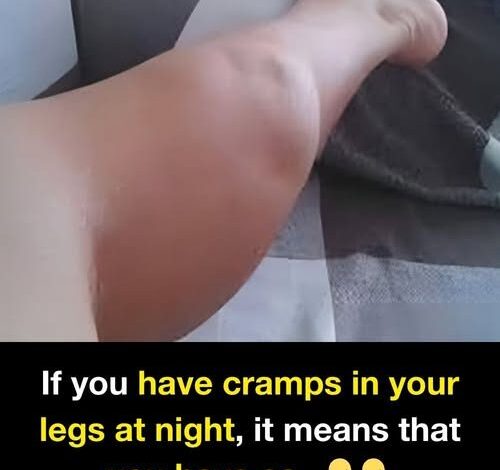
Muscle cramps are sudden, involuntary spasms that tighten a muscle so abruptly they often leave a person frozen in sharp pain. Though they rarely indicate something life-threatening, the intensity of the discomfort can feel unbearable in the moment. For many, cramps strike at night, yanking them from sleep with a stabbing sensation in the calves or feet. Others experience them during exercise, when muscles suddenly seize and refuse to cooperate.
These spasms can last only a few seconds, or they can linger for up to ten agonizing minutes. The calf muscles are the most frequent target, though cramps may also strike the thighs, arches of the feet, or even the hands. While fleeting, the pain can disrupt daily routines and rob people of rest, leaving them sore and uneasy long after the spasm passes.
The causes of muscle cramps are varied, but one of the most common is dehydration. When the body lacks enough fluid, electrolyte levels fall out of balance. Sodium, potassium, magnesium, and calcium are all critical for proper muscle contraction and relaxation. A shortage in any of these minerals can cause the nervous system to misfire, triggering painful spasms. This is why athletes who sweat heavily without replenishing electrolytes often find themselves doubled over with cramps mid-workout.
Mineral deficiencies alone can also set the stage for frequent cramping. Low magnesium is notorious for making muscles twitch and spasm more easily. Inadequate potassium disrupts normal nerve function, while calcium shortages reduce the efficiency of muscular contraction. Even people who drink plenty of water may experience cramps if their diet is consistently lacking in these nutrients.
Overexertion is another key culprit. Muscles pushed beyond their limit—whether during a grueling workout or a long day of physical labor—are more prone to seizing. Fatigue reduces their ability to properly contract and release, leaving them vulnerable. On the opposite end of the spectrum, a sedentary lifestyle can be just as damaging. Muscles that are rarely stretched become stiff, and sitting or standing for long periods without movement places stress on the legs, making nighttime cramps far more likely.
Other health conditions can also contribute. Nerve compression, as seen in sciatica, can trigger spasms in the legs. Pregnant women often struggle with cramps due to circulatory changes and hormonal shifts. Certain medications, including diuretics prescribed for blood pressure and statins used to lower cholesterol, can deplete the body of essential minerals or alter muscle function. Even alcohol, with its dehydrating effect and tendency to disrupt mineral balance, is a frequent hidden cause.
Underlying diseases heighten the risk further. Diabetes affects circulation and nerve sensitivity, both of which can set off cramping episodes. Thyroid disorders can interfere with muscular metabolism, while kidney disease often leads to electrolyte imbalances. Peripheral artery disease, which restricts blood flow to the limbs, leaves muscles under-supplied and prone to painful spasms. For some, cramps are a signal that something deeper may be wrong.
When a cramp strikes, the immediate goal is relief. Massaging the tightened muscle with firm, steady pressure often helps release it. Gentle stretching, such as flexing the foot upward during a calf spasm, can ease the contraction. Some people find walking on their heels helpful, as it forces the muscle to lengthen. Heat therapy—a warm towel, hot shower, or heating pad—relaxes the muscle fibers and speeds recovery. For persistent soreness after the spasm, over-the-counter anti-inflammatories like ibuprofen can provide relief. Interestingly, even unconventional remedies like drinking a small amount of pickle juice have shown benefits, likely because the vinegar rapidly stimulates nerve receptors and interrupts the cramp reflex.
Of course, the best strategy is prevention. Staying hydrated throughout the day, particularly in hot weather or after exercise, is essential. A balanced diet rich in magnesium, potassium, and calcium—think bananas, leafy greens, nuts, seeds, and dairy—goes a long way in reducing the risk. Stretching before bed, especially for people prone to nocturnal cramps, keeps muscles limber. For those on medications known to cause spasms, discussing possible alternatives or supplements with a doctor can make a significant difference.
Muscle cramps may be common, but they are not something to simply accept as an unavoidable nuisance. They are the body’s way of signaling imbalance, fatigue, or neglect. By paying attention to hydration, nutrition, and lifestyle habits, many people can drastically reduce their frequency. And for those whose cramps stem from deeper health conditions, recognizing the pattern and seeking medical advice can uncover problems before they worsen.
Though brief, a muscle cramp leaves an outsized impact. The sharp pain, the lingering soreness, the interrupted sleep—all of it underscores just how much we rely on our muscles to quietly function without protest. Treating them with the respect they deserve—through proper care, movement, and nourishment—is the surest way to keep them strong and silent.





